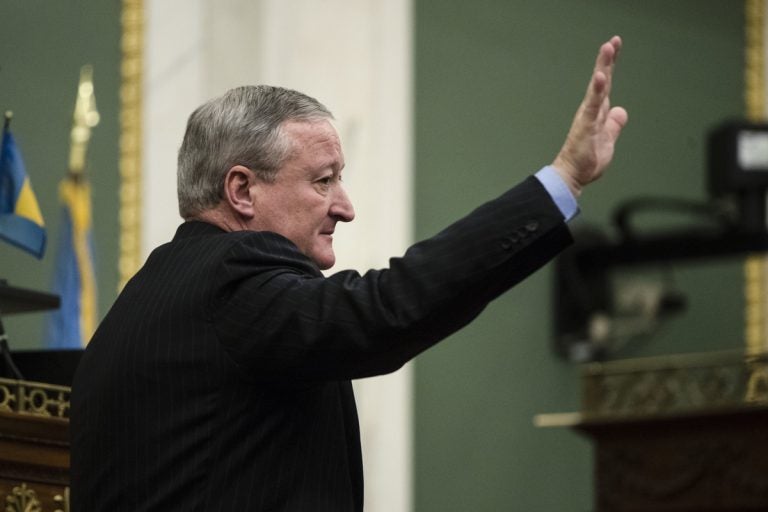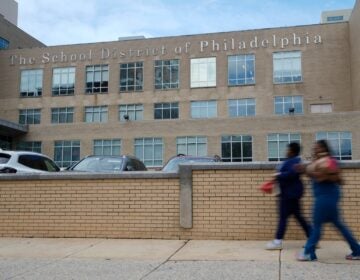On schools, Kenney decided Philly can’t wait any longer

Philadelphia Mayor Jim Kenney gestures after speaking at City Hall in Philadelphia, Thursday, Nov. 2, 2017. Kenney on Thursday called for the panel that governs the city's schools to be dissolved and replaced by mayor-appointed board. (Matt Rourke/AP Photo)
On one of his weekly school visits, made faithfully since taking office, Mayor Jim Kenney was standing in a classroom — he thinks it was a fourth or fifth grade — when he was distracted by water dripping down from a leaky roof.
“How long has it been that way?” he asked the teacher.
“Three years.”
Kenney called a roofer he knew. The leak was fixed within days — gratis.
“The bureaucracy would say that’s not the way we do it,” Kenney said. “But I’m not gonna allow a kid to sit in a leaky classroom for three years because paper work’s not moved from one place to another.”
Nearly every Philadelphia mayor before Kenney has been a peripheral player in the city’s education drama, able to offer only small fixes and, sometimes, a bully pulpit. When it came to healing the whole system, their powers were limited.
Starting next year, however, Kenney will have unprecedented say in the direction of Philadelphia’s schools. This week he took upon himself full responsibility for improving the overburdened and underfunded system, making a dramatic call for an end to the state-dominated body that has run it for 15 years and for the return of a local Board of Education, with all nine members appointed by him.
In an interview on Friday, Kenney said he reached this conclusion after two years of thought, nearly 100 school visits — one every week — conversations with 158 district principals, constant clamor from activists and constituents, and the cresting realization that Harrisburg did not have the will to plug the school district’s impending budget shortfall.
“We’re kind of on our own,” he said. “And I just didn’t want to see our kids start slipping back again. It’s just not fair. We’ve failed at least two generations of people with our public school system.”
Assembling a team
While Kenney feels obligated to take responsibility for the schools, he doesn’t see himself as an education wonk, or a policymaker, or a micromanager. He says he will be able to appoint a board that will cover crucial areas of expertise as well as satisfy the various political
forces that will undoubtedly exert pressure on him as names start surfacing. He said he’d like to see a new Board named by March, so members can be trained and ready to take the reins from the School Reform Commission before the beginning of the next school
year.
Kenney said he’d be looking for people with organizational, legal, and financial skills, qualities outlined in the city charter itself.
“Clearly you want people … who have a commitment to public education,” he said, and parents who have or have had children in the system or a charter school. The city charter also specifies that parents should be on the board.
And, not incidentally, “People who have time, and people who don’t mind working for free.”
Kenney is also conscious of the need for diversity, while declining to detail what that might look like.
“As a white, male mayor it’s important that people feel comfortable that as many groups and individuals are represented as possible,” he said. For the Board of Education that existed before the SRC took over in 2001, there were informal rules — in those days, for instance,
there was a Jewish seat, an Italian seat, an Irish seat, the African American seat, a Northeast seat.
“Certainly the optics are very important considering the demographics of the district,” Kenney said, without being much more specific but stressing that today “people of color, immigrants, LGBT people” all need consideration.
Accountability to voters
He is not, however, a fan of electing the school board, as some of the most ardent education activists are demanding. He said that would again diffuse accountability, instead of concentrating it in one person: himself.
Now under the SRC structure, he said, “the buck doesn’t ultimately stop with anyone,” he said. “If you do an elected school board, you’re going to have the same accountability issue. No one will actually be in charge.”
Since the appointed board members’ terms would be for the same duration as the mayor’s, voters “would have the power to vote out mayors and boards they don’t agree with.”
One of the major problems with the current model is that the accountability is diffused among five different members, the Mayor, the Governor, and the state legislature. The buck doesn’t ultimately stop with anyone. If you do an elected school board, you’re going to have the same accountability issue. No one will actually be in charge. Additionally, since the appointed board’s terms would be co-terminus with the Mayor, they would have the power to vote out Mayors and boards they don’t agree with.
One impetus for Kenney’s call for the end of the SRC was his conclusion that there’s no additional financial help for the District coming from Harrisburg in the near term — at least not before the next gubernatorial election.
But he does think that opportunities for better laws and increased state funding will arise at some point.
He wants to build good relations with GOP legislators, and said his outlook toward charter schools stems partly from political considerations.
He had to be careful how he approached the subject with state legislators, he said.
“If I went in there railing about charter schools and promising to not help charter schools or not deal with them I would have shot myself in the foot in Harrisburg,” Kenney said. “And understandably they would be coming after to us to try and protect the charter schools.”
Kenney believes if state leaders regard him and city officials as “fair to their interests,” he can lobby to push more money through the state’s fair funding formula, reestablish the state reimbursement fund for districts that lose students to charters, and secure other financial
victories for Philadelphia’s schools.
Traditional schools and charters
As for his own beliefs, Kenney emphasized that he is “pro-traditional public schools,” but not anti-school-choice. He noted he’s a product of Catholic schools, once sat on the board of Independence Charter School, and helped start South Philadelphia’s Christopher Columbus Charter School. He also described himself as a supporter of two tax-funded scholarship programs for children who attend private and parochial schools.
“I’m not an ideologue, anti-charter-school person at all,” he said.
Growing charter and pension costs have torpedoed the district’s financial outlook. By next fiscal year Philadelphia school officials project a shortfall, that would climb to nearly a billion dollars by fiscal year 2022 without new revenue or cuts.
Kenney has said repeatedly he will not allow the district to cut staff and services like it did in the early part of the decade. That would imply the city needs to up its contribution by either reallocating tax dollars or raising new money.
The mayor would not divulge his plan for meeting the district’s financial needs, saying it would be political folly to pledge tax raises more than half a year before the city budget is due.
“Of course you guys would write about it — that’s what your job is — it would get bashed for the next three months, and Council people would get set upon, and the twitterverse would go crazy and the trolls would come out,” Kenney said.
The mayor, per tradition, will give a budget address in early March that lays out his plan for funding city schools. From March to June, he said, City Council and the public can pick over his proposal.
But Kenney is already laying the rhetorical groundwork for increased investment in public schools.
“I explain to people who get angry about paying for public school, I say, well, you’re paying for opioid addiction treatment, you’re paying for gun violence, you’re paying for incarceration, you’re paying for prosecutions, you’re paying for lots of stuff you shouldn’t be paying for,” he said, “if we could put that money, theoretically into education.”
For this mayor, it’s not theoretical anymore. He has given himself — and all future mayors — a mandate around public education. His instinct is to act. As he explained, his voice getting more agitated:
“It drives me crazy when I go into some of these schools and there’s a persistent leak that’s been there for three years.”
The persistent leak in Philadelphia’s public school system has been there far longer. Kenney will soon be in charge of fixing it.
WHYY is your source for fact-based, in-depth journalism and information. As a nonprofit organization, we rely on financial support from readers like you. Please give today.




